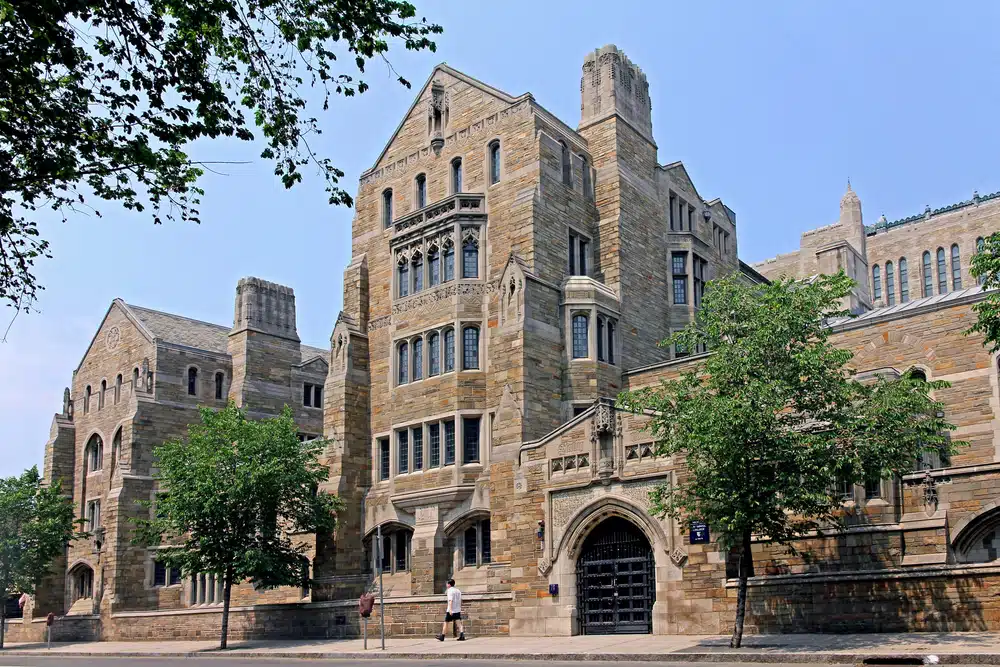Yale’s Ranking: A Comprehensive Analysis
Yale’s ranking has long been a subject of interest for students, parents, and academic professionals alike, as it consistently earns top spots in global and national lists. Known for its dedication to academic excellence, world-class research, and a diverse campus community, Yale’s prestigious reputation extends far beyond the Ivy League. As a leading institution, Yale University’s Ranking is a testament to its ongoing commitment to providing an unparalleled educational experience that prepares students to make a positive impact on the world.
In this blog post, we will delve into the various factors that contribute to Yale’s ranking, shedding light on what makes this institution stand out among its peers. We will also explore the different organizations responsible for assessing and ranking universities and how these rankings can significantly influence a student’s academic journey and future opportunities.
Understanding the elements that contribute to Yale’s ranking will provide valuable insights for prospective students and serve as a testament to the university’s dedication to fostering a thriving academic environment.
Overview of Yale University
Yale University is a private Ivy League research university located in New Haven, Connecticut, United States. Established in 1701 as the Collegiate School, it is the third-oldest institution of higher education in the country. In 1718, the school was renamed Yale College in honor of Elihu Yale, a wealthy British merchant, and philanthropist who made substantial donations to the institution. Over the centuries, Yale has grown into one of the world’s most respected and influential academic institutions, renowned for its dedication to academic excellence, ground-breaking research, and a rich intellectual community.
Sprawling across 837 acres, Yale University’s campus is an architectural marvel, boasting Gothic and modern structures that house its many academic departments, research facilities, libraries, museums, and residential colleges. The university offers undergraduate, graduate, and professional degrees across a wide range of disciplines, including liberal arts and sciences, engineering, law, business, medicine, art, and architecture. Yale’s commitment to maintaining a diverse and inclusive student body ensures that individuals from different backgrounds, cultures, and perspectives can learn and grow together, fostering a global perspective in its students.
Yale is particularly well-known for its residential college system, which provides students with a supportive and close-knit community within the larger university. Each residential college houses a cross-section of students, offering them dining halls, common rooms, and other amenities, creating a sense of belonging and facilitating strong connections among students and faculty members.
Yale University’s distinguished faculty comprises experts in their respective fields, many of whom are recipients of prestigious awards such as the Nobel Prize, the Pulitzer Prize, and the National Medal of Science, among others. The faculty’s commitment to innovative teaching and research has significantly contributed to Yale’s esteemed reputation.
The university’s emphasis on research, innovation, and collaboration is evident through its extensive network of research centers, libraries, and laboratories. Yale’s sterling reputation as a research institution attracts considerable funding, further enhancing its academic and research endeavors.
Yale University has produced numerous notable alumni, including multiple U.S. presidents, Supreme Court justices, diplomats, scholars, and business leaders. Its strong alumni network offers valuable networking opportunities and resources for current students and recent graduates, contributing to Yale’s overall reputation for academic excellence and post-graduate success.
In all, Yale University is a prestigious Ivy League institution with a long history of commitment to academic excellence, research, and fostering an inclusive, diverse, and intellectually stimulating environment. Its distinguished faculty, cutting-edge research, and the broad range of academic disciplines make it a top choice for students from all over the world seeking an unparalleled educational experience.
What is the Ranking of Yale University?
What is the ranking of Yale University? Yale’s ranking is consistently high across various national and global ranking systems, a reflection of the university’s commitment to academic excellence, research, and a vibrant campus environment. Multiple organizations assess and rank universities based on different criteria, including academic reputation, faculty credentials, research output, selectivity, financial resources, and global engagement. Yale University consistently performs exceptionally well in these assessments, making it one of the top universities worldwide.
The following is a summary of Yale’s ranking according to four well-known ranking organizations as of 2023:
U.S. News & World Report
According to the U.S. News & World Report (USNWR) rankings, as of 2022, Yale University holds the 3rd position among National Universities and also 3rd in the Best Value Schools in the United States. USNWR is one of the most reputable sources for university rankings, and its annual lists are highly regarded by students, educators, and academic institutions alike. The USNWR rankings are based on a comprehensive methodology that assesses a variety of factors reflecting the overall quality and reputation of an institution.
The factors considered in USNWR’s ranking system include academic reputation, faculty resources, student selectivity, financial resources, graduation and retention rates, and alumni giving rate. Each of these factors contributes to the overall score assigned to a university, which determines its position in the rankings.
Yale University’s impressive 3rd position in the USNWR National Universities ranking can be attributed to several factors, such as:
Academic Reputation: Yale has a long-standing reputation for offering rigorous and innovative academic programs led by distinguished faculty members. Its commitment to academic excellence has solidified the university’s prestigious standing among institutions worldwide.
Faculty Resources: The esteemed faculty at Yale includes experts in various fields, many of whom have received prestigious awards and accolades for their work. This wealth of faculty talent and expertise significantly contributes to Yale’s ranking.
Student Selectivity: Yale is known for its highly selective admissions process, which ensures that the university maintains high academic standards and attracts a diverse and talented student body.
Financial Resources: Yale’s substantial endowment enables the university to invest in state-of-the-art facilities, resources, and research initiatives, further strengthening its position in the rankings.
Graduation and Retention Rates: Yale boasts impressive graduation and retention rates, reflecting the university’s commitment to student success and the quality of its academic programs and support services.
Alumni Giving Rate: A strong alumni giving rate is an indicator of alumni satisfaction and engagement, which speaks to the quality of the education and overall experience provided by Yale University.
Times Higher Education
As of 2023, the Times Higher Education (THE) World University Rankings place Yale University in 9th position globally and 4th in the United States. The THE ranking is a widely recognized and respected source for evaluating universities worldwide, providing insights into their relative strengths and weaknesses across various dimensions.
The Times Higher Education World University Rankings utilize a comprehensive methodology based on 13 performance indicators. These indicators are grouped into five broad categories, each representing a specific aspect of a university’s performance:
Teaching (30%): This category evaluates the learning environment and quality of instruction, incorporating factors such as reputation surveys, faculty-to-student ratios, and institutional income.
Research (30%): THE assesses a university’s reputation for research excellence, research income, and the productivity of its research output.
Citations (30%): This category measures the impact of a university’s research by examining the number of times its published work is cited by other scholars.
International Outlook (7.5%): To gauge a university’s global engagement, THE considers the proportion of international students and staff, as well as the extent of international collaboration in research.
Industry Income (2.5%): This category assesses a university’s ability to attract industry funding, which is an indication of how well it translates its research into practical applications.
Yale University’s 9th place in the Times Higher Education World University Rankings reflects its consistent excellence across these various dimensions. Its strong performance can be attributed to factors such as:
Exceptional Teaching: Yale’s commitment to providing a high-quality learning environment, distinguished faculty, and innovative academic programs ensures students receive an unparalleled education.
Research Prowess: Yale’s reputation for cutting-edge research and its emphasis on interdisciplinary collaboration contribute to its high ranking in this category.
Citation Impact: The university’s research output is widely recognized and cited by scholars globally, indicating the significant impact of its research on various fields.
International Outlook: Yale’s commitment to diversity and internationalism, as demonstrated by its diverse student body and global partnerships, enhances its reputation as a leading institution in the world.
Industry Income: The university’s ability to attract funding from industry partners demonstrates the practical relevance and application of its research endeavors.
QS World University Rankings
As of 2023, Yale University holds the 18th position in the QS World University Rankings, a prestigious global ranking system that evaluates universities across various aspects of academic performance. The QS rankings are widely recognized by students, educators, and academic institutions, providing a comprehensive and reliable snapshot of a university’s standing on the global stage.
The QS World University Rankings utilize a methodology that assesses universities based on six key metrics, which together create an overall score for each institution:
Academic Reputation (40%): This metric is derived from a global survey of academics, who provide their insights into the quality of teaching and research at various institutions.
Employer Reputation (10%): Employer opinions on the preparedness and quality of an institution’s graduates are gathered through a global survey, which feeds into this metric.
Faculty-to-Student Ratio (20%): This metric serves as a proxy for the quality of the teaching environment, with a higher ratio indicating smaller class sizes and greater access to faculty support.
Citations per Faculty (20%): This metric measures the research impact of an institution by examining the number of times its faculty’s published work is cited by other scholars.
International Faculty Ratio (5%): This metric assesses a university’s commitment to attracting and retaining international faculty, reflecting its global outlook and diversity.
International Student Ratio (5%): This metric evaluates the proportion of international students within the university, providing an indication of the institution’s appeal to students from around the world.
Yale University’s 18th place in the QS World University Rankings reflects its strong performance across these key metrics. Its high ranking can be attributed to several factors, such as:
Academic Reputation: Yale’s long-standing commitment to academic excellence and rigorous, innovative programs contributes to its exceptional academic reputation.
Employer Reputation: Graduates from Yale University are highly regarded by employers, which is an indication of the institution’s success in preparing students for their future careers.
Faculty-to-Student Ratio: Yale’s favorable faculty-to-student ratio ensures a supportive teaching environment, providing students with greater access to faculty guidance and resources.
Research Impact: The university’s research output is highly cited by scholars around the world, showcasing the significant impact of its research across various fields.
International Faculty and Student Body: Yale’s diverse faculty and student body highlight its commitment to fostering a globally-engaged and inclusive campus community.
Yale University’s high ranking in these prestigious lists can be attributed to several factors, including its strong academic reputation, distinguished faculty, rigorous academic programs, commitment to research and innovation, selective admissions process, and supportive and inclusive campus environment. These rankings are an acknowledgment of Yale’s dedication to providing an exceptional educational experience for its students.
It is important to note that rankings are just one of many factors to consider when evaluating a university. While Yale’s ranking speaks to its overall quality and reputation, prospective students should also take into account factors such as available programs, campus culture, location, and financial aid opportunities when making their college decision.
The ranking of Yale University across various systems consistently places it among the top universities in the world, showcasing its commitment to academic excellence, research, and fostering a world-class educational experience for its students. These rankings serve as a testament to the university’s ongoing efforts to maintain its esteemed reputation and continue providing opportunities for intellectual growth and personal development.
Why Do College Rankings Matter?
Why do college rankings matter? College rankings play a significant role for Yale University as well as for prospective students, current students, faculty, and alumni. These rankings are crucial in evaluating the overall standing of a university in various aspects of academic performance, research output, and campus environment. For Yale, these rankings matter for several reasons:
Attracting High-Quality Students: Yale’s high ranking in prestigious lists like the U.S. News & World Report, Times Higher Education, and QS World University Rankings can help attract a diverse pool of talented and motivated students from across the globe. A higher ranking is often seen as an indicator of a university’s quality, and students are more likely to choose top-ranked institutions for their education.
Enhancing Reputation and Prestige: Yale’s consistent high ranking serves as a testament to its academic excellence, research prowess, and commitment to providing a world-class education. A high ranking helps enhance the university’s reputation and prestige, which in turn strengthens its position among elite academic institutions globally.
Faculty Recruitment and Retention: Yale’s ranking plays a significant role in attracting and retaining top-notch faculty members, who are drawn to institutions with excellent reputations for teaching and research. A prestigious faculty contributes to Yale’s commitment to academic excellence and further bolsters its position in the rankings.
Increased Research Funding: Yale’s ranking often attracts more funding from both public and private sources, enabling Yale to invest in state-of-the-art research facilities, equipment, and resources. Increased funding can also support more faculty research positions and scholarships, further promoting research excellence and innovation at the university.
Alumni Engagement and Support: Yale’s high rankings help foster a strong sense of pride and engagement among alumni, who play a crucial role in supporting the university financially and through mentorship and networking opportunities. Alumni support contributes to the university’s ongoing success and can help improve its ranking further.
Encouraging Continuous Improvement: College rankings provide valuable feedback for Yale, highlighting areas where the university excels and those that may need improvement. By addressing these areas, the university can continuously improve its offerings and maintain or enhance its position in the rankings.
Informed Decision-making for Prospective Students: College rankings matter for prospective students, as they often use them as a starting point to gather information on the best universities for their educational and career goals. Yale’s high rankings in various lists make it a top choice for students seeking world-class education, fostering a competitive and diverse learning environment.
College rankings matter for Yale University in multiple ways, including attracting top-tier students and faculty, enhancing its reputation and prestige, securing research funding, and promoting continuous improvement. These rankings serve as an acknowledgment of Yale’s commitment to academic excellence, research innovation, and fostering a thriving campus community, further solidifying its position as a leading institution of higher education.
Want to learn more about your chances of getting into Yale University? You’ve come to the right place. At AdmissionSight, we have over 10 years of experience guiding students through the competitive admissions process.
AdmissionSight can help you put your best foot forward when applying to college this fall. Contact us today for more information on our services.










































